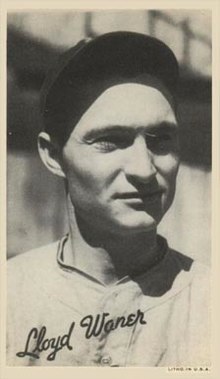Lloyd Waner
| Lloyd Waner | |||
|---|---|---|---|
 |
|||
| Center fielder | |||
|
Born: March 16, 1906 Harrah, Oklahoma |
|||
|
Died: July 22, 1982 (aged 76) Oklahoma City, Oklahoma |
|||
|
|||
| MLB debut | |||
| April 12, 1927, for the Pittsburgh Pirates | |||
| Last MLB appearance | |||
| September 16, 1945, for the Pittsburgh Pirates | |||
| MLB statistics | |||
| Batting average | .316 | ||
| Hits | 2,459 | ||
| Runs batted in | 598 | ||
| Teams | |||
| Career highlights and awards | |||
| Member of the National | |||
|
|
|||
| Inducted | 1967 | ||
| Election Method | Veteran's Committee | ||
Lloyd James Waner (March 16, 1906 – July 22, 1982), nicknamed "Little Poison", was a Major League Baseball (MLB) center fielder. His small stature at 5 ft 9 in (1.75 m) and 132 lb (68 kg) made him one of the smallest players of his era. Along with his brother, Paul Waner, he anchored the Pittsburgh Pirates outfield throughout the 1920s and 1930s. After brief stints with four other teams late in his career, Waner retired as a Pirate.
Waner finished with a batting average over .300 in ten seasons. He earned a selection to the MLB All-Star Game in 1938. Lloyd and Paul Waner set the record for career hits by brothers in MLB. He was elected into the National Baseball Hall of Fame by the Veterans Committee in 1967. He worked as a scout for the Pirates and the Baltimore Orioles after retiring as a player.
Waner was born on March 16, 1906 in Harrah, Oklahoma, and grew up on a farm with his older brother, Paul. The two worked from dawn to dusk every day, and baseball was their only form of entertainment. Influenced by their father, who was a minor league player in Oklahoma City, Paul and Lloyd's love and natural talent for the game developed over the years. The Waners learned to hit against corncobs and cut down saplings in the woods to use as bats. Lloyd graduated from McLoud High School and attended three semesters at East Central State University in Ada, Oklahoma before going into professional baseball.
Waner started his professional baseball career in 1925 with the San Francisco Seals of the Pacific Coast League, but he hit poorly. He was offered a tryout for the Pirates at the urging of his brother, who had been discovered in Ada by Pirates scout Joe Devine. In 1926, he batted .345 in the Class B South Atlantic League. He also won the league's most valuable player award.
...
Wikipedia
